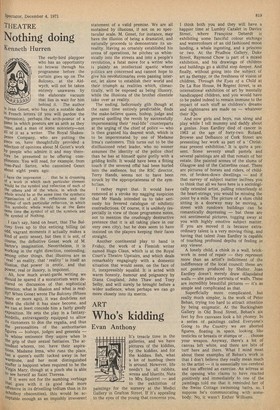THEATRE
Nothing doing Kenneth Hurren
The early-bird playgoer who has an opportunity to browse through his programme before the curtain goes up on The Balcony, at the Aldwych, will not be taken entirely unawares by the elaborate vacuum that lies in wait for him behind it. The author
Jean Genet, who has cut a notable dash in French letters (if you will pardon the expression), perhaps the arch-poseur of a game in which poseurs are as arch as they Corne, and a man of some notoriety—not ell of it as a writer. The Royal ShakesPeare Company, who are putting the Piece on, have thoughtfully provided a selection of opinions about M Genet's work by people who admire it and may therefore be presumed to be offering comPliments. You will read, for example, from Jean-Paul Sartre, who canonised Genet about eight years ago: I have the impression . . . that he is dreaming of a work in which each particular element would be the symbol and reflection of each of the others and of the whole, in which the Whole would be at the same time the synthetic °rganisation of all the reflections and the symbol of each particular reflection, in which this symbolic whole would be at the game same time the symbol of all the symbols and the symbol of Nothing.
I can't say, hand on heart, that The Balcony lives up to this enticing billing (at Odd, vagrant moments it actuality makes a kind of antic sense), but then it is not, of course, the definitive Genet work of M. Sartre's imagination. Nevertheless, it is Working in the right direction, contending, ,arnong other things, that illusions are as real ' as reality, that reality ' is itself an illusion, that power is erotic, and that Power, real or ilusory, is impotent.
Ah, how much avant-garde writing we should be spared if a moratorium were declared on discussion of that sophistical question: what is illusion and what is reality? When Genet wrote The Balcony (fifteen Years or more ago), it was doubtless not quite the cliche it has since become, and We can at least concede him a fairly gaudy eXposition. He sets the play in a fantasybordello, extravagantly equipped to allow its customers to don the regalia, and thus the personalities of the authoritarian Figures — bishops, judges and generals — to whose eminence they aspire when in the grip of their sexual fantasies. The attendant whores, too, have their aspirations. Madame Irma, who runs the place, has a queen's outfit tucked away in her Wardrobe, and her most distinguished Staffer is happiest when required to be the Virgin Mary, though at a pinch she is able to see herself as Saint Theresa.
If it were not for the numbing verbiage that goes with it (a good deal more Offensive in its drivelling tedium than in its scholboy obscenities), this would be acceptable enough as an impishly irreverent
statement of a valid premise. We are all sustained by illusions, if not on so spectacular scale. M. Genet, for instance, may have the illusion of being a dramatist, and naturally proceeds to demonstrate its unreality. Having so ornately established his arena of operations, he pitches us whimsically into the streets and into a people's revolution, a fatal move for a writer who is plainly an intellectual spastic where politics are concerned and cannot hope to give his revolutionaries even passing interest, let alone to establish their world and their triumph as realities which, climactically, will be exposed as being illusory, while the illusions of the brothel clientele take over as reality.
The ending, ludicrously glib though at the same time entirely predictable, finds the make-believe queen, bishop, judge and general quelling the revolt by successfully impersonating their ' real-life ' counterparts at the urging of the chief of police — who is then granted his dearest wish, which is to be impersonated by one of Madame Irma's customers. This turns out to be the disillusioned rebel leader, who no sooner assumes the identity of the police chief than he has at himself quite gorily with a gelding knife. It would have been a fitting touch if the severed offal had been hurled into the audience, but the RSC director, Terry Hands, seems not to have been struck by the appropriateness of the symbolism.
I rather regret that. It would have removed at a stroke my nagging suspicion that Mr Hands intended us to take seriously his fevered catalogue of nihilistic contradictions. Of course, it is unlikely (especially in view of those programme notes, not to mention the crushingly destructive pretence that it is all taking place in our very own city), but he does seem to have insisted on the players keeping their faces straight.
Another continental play to hand is Friday, the work of a Flemish writer named Hugo Claus, which is at the Royal Court's Theatre Upstairs, and which deals remarkably engagingly with a domestic situation that would seem, on the face of it, inexpressibly squalid. It is acted with warm honesty, humour and poignancy by Diana Coupland, John Thaw and Tony Selby, and will surely be brought before a wider audience, when perhaps we can go more closely into its merits.










































 Previous page
Previous page